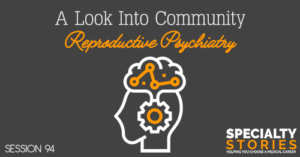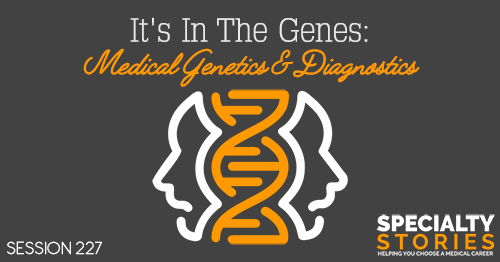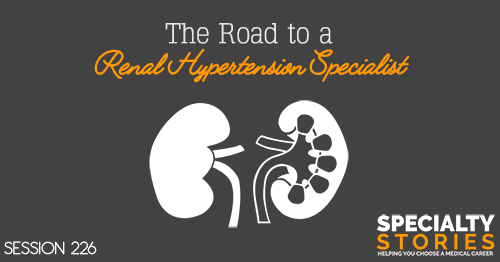Apple Podcasts | Google Podcasts

Session 94
Today’s guest is Dr. Carly Snyder, a reproductive psychiatrist, a specialty which is probably something a lot of people don’t know about. In fact, she didn’t know it existed until she was in her psychiatry residency.
She talks about her journey, what she likes about it, and what she doesn’t. Get a glimpse of what her world looks like. Maybe this is something you’re interested in too.
Also, please be sure to check out Meded Media for more podcasts as you’re looking for resources to help you along this journey towards medical school and residency.
[01:30] Interest in Reproductive Psychiatry
Carly didn’t know reproductive psychiatry existed when she started residency. As a psychiatry resident, she did 4-6 months of medicine and pediatrics.
Throughout that period, she kept on questioning psychiatry as she didn’t like inpatient psychiatry. She found it depressing and it wasn’t how she imagined her career would be.
While on the pediatrics floor, she met a 3-month-old boy who suffered from seizures since he was born. Having a baby boy at that time as well, she identified with the mom that she had a very strong drive to help her. The child eventually died but the mom was doing well for having a strong support network already in place.
They then decided they were going to set up a program where every woman who’s baby or child was dying was going to be connected with a counselor or therapist who will focus on the moms. This was an aha moment for her that she could actually affect change and help women.
At that time, one of their senior residents’ wives was doing reproductive psychiatry. Eventually, she took an elective at Cornell University where they had a women’s mental health program.
It had a perfect mix of women’s mental health and medicine. You think about the baby and the family system. You also have to consider whether there was a medical issue going on.
After residency, she was given the directorship of women’s mental health program.
'It's a huge transition in life. And to be able to support women through that process is incredibly rewarding.'Click To Tweet[06:45] Types of Patients
She sees women throughout the reproductive lifespan. Her practice is limited to adult women.
The vast majority of her patients come to see her for 4-5 times who have history in depression, anxiety, bipolar disorder, or some psychiatric illness.
They may or may not be on medication but they’re looking towards a planned pregnancy. They want to figure out how to optimize their mood and keeping them stable. At the same time, they strategize on how to minimize risk from either exposure to medication and/or exposure to untreated illness. You have to weigh both sides of it.
'A fair number of my patients are in fertility treatment and they're all referred by reproductive endocrinologists.'Click To TweetMoreover, some patients come to see her when they’re pregnant because they’re experiencing mood symptoms, and sometimes women in their postpartum. Carly finds is fun and rewarding to see women’s families grow and see their lives unfold.
She also has a group of patients with severe PMS called PMDD where they come to see her every month for a variable number of days. Their mood changes to a degree that their ability to function has been impacted.
[10:05] Traits that Lead to Being a Good Reproductive Psychiatrist
'One needs to have empathy in any specialty.'Click To TweetEmpathy tops Carly’s list. Think about your patients’ lives, not from a standpoint of that specific medication and that’s it. But you think about it from a standpoint of their family structure. Think about their future plans and their past. Think about the big picture.
That being said, you also have to consider multiple factors. Make sure there’s no underlying medical illness going on that’s masking or feeding into a psychiatric illness.
Additionally, you can’t be dictatorial where the way you think is the way it should be. You, as a physician, may have a very rational approach to why you’d recommend xyz. Their anxiety means they’re being completely irrational and that’s okay. Work with them to get to where they want to go, not where you think they should be.
People have anxiety all throughout different phases – planning pregnancy, fertility treatment, pregnancy, post-partum. This is normal to some degree but it shouldn’t negatively impact your ability to function and enjoy life.
Take everything you’re hearing and assimilate it into a picture to get a sense of what is going on that is actually appropriate versus what’s excessive. Determine it quickly because women don’t want to wait and see for a while.
'It's a time of huge flux and change. Our job is to support them through that process in whatever way, but support them in real-time.'Click To Tweet[14:41] Why Psychiatry?
Carly initially planned on doing plastic surgery but when she got to medical school, she had written off all but medicine.
When she was in 3rd-year medical school, she came across a patient with fevers of unknown origin that had been cynical. He was admitted to the floor reserved for patients with TB.
He got discharged eventually since they weren’t able to figure out what was wrong. But his liver function tests came back really high. She then went in and was drawing multiple vials of blood but the patient took the butterfly out and blood was just going everywhere.
She then tried to put the needle back on his arm. But the patient took the needle out of his hand and jabbed it into hers.
It turned out that the patient had Hep B, Hep C, and HIV-2. So Carly obviously had to be on a really nasty cocktail of medicines for three months. She was on a gazillion meds. That prompted her to not go into medicine. She didn’t want to have anything to do with the specialty at all.
Her next rotation was surgery and loved it. She also married a neurosurgeon during her third year at medical school.
As she finished medical school and having spent her fourth year doing plastic surgery rotations, she was about to have a baby. She planned on taking a year off between medical school and residency because her husband did a fellowship in Toronto.
Still not wanting to do medicine, she ultimately took psychiatry (Her dad was a psychiatrist too.) But she found inpatient psychiatry difficult. Then she eventually found her footing in psychiatry in general and found her niche within it.
[20:28] Typical Day
Carly’s third kid was born a preemie, so she had a very first year of life medically. At that point, her dad encouraged her to join his practice. Her dad also convinced her not to work full-time so she can focus on her kid at the same time.
'Psychiatry has an amazing amount of flexibility depending on how you structure your practice.'Click To TweetCurrently, she spends time in her office two days a week from 8am-8pm. She has back-to-back patients throughout the day.
She sees patients for their 15-minute medication follow up, which tends to be extended at times. She sees the vast majority of her patients for 45 minutes. She not only talks with them about how they’re feeling but also how they feel about treatment. She answers questions they have about the risk, benefits, alternative, and dosing.
She becomes a safe place for women to come and talk about parenthood or fertility treatments, or their frustrations with the whole fertility process. They could talk about marital issues as it relates to the fertility process.
In pregnancy, they struggle when people give them all this advice. It’s not just a question of pharmacology, but how she can be supportive as someone who understands all the facets in their life.
Carly says she can be a place where patients can come and talk through what you’re experiencing. Second, she can realize when it’s appropriate. Lastly, she’d take a step back and then push on later. This never happens in 15 minutes of course.
Carly runs her radio shows on Wednesdays so she preps by doing at lof writing. She writes a fair amount of parenting-related stuff.
[24:45] Taking Calls
She’s the only reproductive psychiatrist in their team and everyone does child, adolescent, and adult. So she takes calls 24/7. But she can just do it at home even when she’s on call. But she rarely gets SOS calls.
'I educated people in advance so there isn't time to question mark about what to do?'Click To Tweet[26:08] Training Path
There are a few fellowships available. You can find your own path. Find a mentor. As an attending at Cornell now, they have a rotation for residents. Some people go through Consultation Liaison. Or you can just have a mentor that supports you through the process. There are also conferences where you can learn more from.
Reproductive psychiatry is not a big field. It’s even pretty rare that she has never heard of someone doing what she does. But they do all other things as well.
Carly used to be on the board for Postpartum Support International (PSI) and now she’s on the President’s Advisory Committee. PSI is the leading resource for women and their families suffering from various perinatal mood disorders.
'We're still a small field and unfortunately, a lot of people don't know that we exist, which is unfortunate for people who are suffering and unsure where to turn.'Click To Tweet[29:15] Subspecialty Opportunities
There are people who focus more on PMDD and do more research on it. Others are interested in Postpartum Psychosis, which is very research-driven.
A third of her practice is fertility-focused although she doesn’t think this is the norm. But you can subspecialize in this too. Additionally, some focus on perimenopause-related mood disturbances.
[30:45] Bias Towards DOs and Working with Primary Care
Carly doesn’t think there is bias towards DOs in their field.
In terms of working with primary care, she has a sound referral network at this point. She’s also lucky to have a group of colleagues and friends that encompass various specialties that support women in the same phases she sees. It’s very easy to collaborate together.
But as she was still starting out, she would go to different conferences. She’d walk up and introduce herself. She also got into the PSI board early on in her career so she had that connection.
'When I meet a pediatrician, my goal is for them to appreciate that I'm available for their patients.'Click To TweetShe helps in creating an online course for Postpartum Support International for primary care providers. It’s a two-day course that can be done online. It’s specifically for frontline providers so they can feel more empowered and understand perinatal mood disorders more. And so they can treat accordingly.
They also have a consulting service through PSI. But at the end of the day, what she wants primary care providers to know about them is that reproductive psychiatrists exist as a resource. They specialize in treating women throughout their reproductive life cycle.
If a woman said “I’m pregnant,” people would say stop your medication. Save for a few medicines, there is really a risk-benefit discussion to be had between the risk of untreated illness and the benefits of medication. Stopping the medication can even be more dangerous and can present more risk than remaining on medication.
That being said, just realize they exist as a resource. And seek them out if you have questions rather than advising the patient to stop medication. Sometimes, they should. But this is not the go-to answer in general.
'Pregnancy is a very dynamic time physiologically and you have to keep up with the physiologic changes that occur in order to get people stable.'Click To Tweet[37:00] Working With Other Specialties
Reproductive psychiatrists work closely with pediatricians. Carly mentions there is now a push for check-in visit between that 0-6 week mark with an OB/GYN. But this can be done on the phone. Whereas the pediatrician becomes the single frontline provider because they’re seeing both the mom and the baby.
Other specialties they work closely with are rheumatologists, internists, and other psychiatrists.
[38:16] Special Opportunities Outside of Clinical Medicine
You can actually do research. Carly does a lot of writing. She says that you can pretty much do whatever you want to do actually and create your own path. As a side gig, she has a business with acupuncturists where they’re developing a nutritional bar line food for women. You can really find lots of different ways to use your practice.
'You make your own path.'Click To Tweet[40:00] Most and Least Liked Things
Carly advises that as a reproductive psychiatrist, you have to listen to what she thinks, what she wants, and where she’s at, before presenting options. It’s not your body, it’s hers. It’s not your future baby, it’s hers.
'Approach each woman as the unique individual she is rather than thinking about purely from which a standpoint of which medication is best.'Click To TweetPresent all the information that’s available now and allow her to make an informed decision. Ultimately, it’s her job is to enforce that and not have anyone feel like it’s being taken away.
What Carly loves about her specialty is when her patients get better. When they do, they find joy in motherhood. Being able to help a woman enjoy being a mom and enjoying her life is simply rewarding.
'Parenting is a magical thing. It's so sad when someone isn't seeing that magic, where they really just feel pain in the whole process.'Click To TweetOn the flip side, what she likes the least, not specific to her specialty, is the paperwork. Also, when one of her patients get really sick, it’s scary. She would have nights where she’s worried and anxious for her patients.
[44:45] Major Changes in the Field
Carly thinks the field is growing and expanding with more and more data and research available and supporting what they do. It has been very important both for mom and her baby – both from emotional and physical standpoints.
There’s also recent medication that is soon to be released which is the IV formulation for the treatment of postpartum depression. There will also be an oral formulation for this.
'There are new treatments that are being offered which will let us help women get better that much faster.'Click To TweetThere will be an understanding of the different subtypes of antepartum and postpartum depression and anxiety, the different causes, and treatment. They can hone in on various symptoms when they know the underlying mechanisms. And they’re getting great data about this.
[46:25] Final Words of Wisdom
If she had to do it all over again, she would still pick the same specialty. Finally, she wishes to tell students who might be interested in this specialty is to find someone to shadow. It’s one thing to read about, but it’s another thing to do it. Find them and check out what they do in person.
Ultimately, you have to really like working with moms and women who are going to be moms, and who are anxious. Have an open mind and be ready and see what pulls you.
Links:
SEARCH SITE
LISTEN FOR FREE











